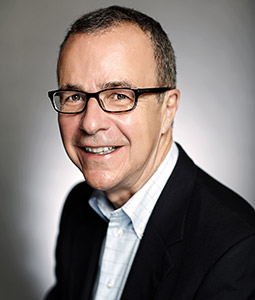Conference Preview: A Q & A With Speakers Ron Culp and Ryan McShane
The PRSSA 2015 National Conference in Atlanta is just around the corner, and like most students, I’ve anxiously reviewed the program to find the sessions I’m most looking forward to. Not surprisingly as the publications editor in chief, I’m excited for the professional development session on writing hosted by Ron Culp (RC) of DePaul University and Ryan McShane (RM) of Tattoo Projects.
Below is a sneak peek of their session “Writing Right: The Number One Skill Employers Want” scheduled for Saturday, Nov. 7.

1. What “sneak peek” can you offer students about your session at National Conference and why should students attend this session?
RC: Students will learn the 10 grammar faux pas that drive supervisors crazy. Avoiding these mistakes will make you look smarter than fellow employees who consistently make writing errors.
RM: Students will leave the session with a better understanding of how to make their writing more purposeful and efficient.
2. What role has writing played in your everyday career?
RC: During the early days of my career, bosses noticed that I enjoyed writing. As a result, I got tapped to attend meetings “above my pay grade” and that often led to my being asked to help senior management write and edit major communications ranging from merger and acquisition announcements to the hiring of a new CEO. Without question, my career advancement was aided by my writing skills. A CEO once thanked me for my initial draft of his annual report letter to shareholders. He said he felt the writing style communicated a complicated matter in a very understandable way. Shortly afterwards, I was asked to rewrite a speech that had been written for him by a highly paid professional speechwriter. I was promoted shortly after that speech.
RM: Written communication is a fundamental skill within public relations that plays a pivotal role each and every day of a practitioner’s career. We write to inform, persuade, educate and entertain; we distribute our writing to colleagues, clients, media contacts and consumers; we write on behalf of our agencies, the brands we represent, corporate executives and celebrity spokespersons. As communications professionals, we are in the business of words.

3. Why is quality writing such a valuable skill to employers?
RC: Unfortunately, too many public relations professionals hate writing. It shows up quickly and is noticed by supervisors. Meanwhile, good writers are promptly identified and generally become involved sooner in higher level assignments. Not all, but most chief communications officers and agency heads are good writers.
RM: All writing has a purpose, and quality writing helps inform the intended result. Employees who can write are efficient because they avoid confusion and misinterpretation of their words. They also establish thought-leadership, because their words resonate and elicit a positive reaction.
4. What’s the most frequent mistake students/interns make in their writing?
RC: Singular nouns require singular pronouns, yet this is the most common mistake of many writers, not just students and interns. Edelman is a singular noun so the right pronoun is “it” or “its” not “they.” I know it sounds odd at first, but it’s correct grammar. And, yes, I make the mistake myself from time to time, especially in conversation.
RM: Beyond simple grammatical mistakes, inexperienced writers often overuse unneeded phrases that do not add to the intended thought. A teacher once challenged our class to imagine having to pay for every word we use in our writing. This simple exercise is effective in making us think about the words that truly communicate.
5. What is the best way to practice writing in college?
RC: Read your writing aloud. This exercise alone will catch errors, including typos because you focus on each and every word. If you struggle with writing, go to your college’s writing center. Most colleges have such services, usually staffed by English majors or recent graduates. They are there to help, not judge. It’s far better to face their “criticism” of your work than frustrate your professor. Do this now rather than take bad writing habits to your full-time job.
RM: I encourage all prospective public relations professionals to contribute to their respective university newspaper. My three years as a sports editor and editor-in-chief helped in more ways than I knew at the time. Serving as an editor demanded that I master AP Style, and my own writing style was influenced by those who I regularly read and edited their work.
6. How do you continue to improve your own writing even after college, besides in the workplace?
RC: When reading a newspaper or magazine article, I circle or jot down words I don’t know. I then look them up. I automatically slip into a copy editor mode as I read everything. I especially enjoy catching grammar errors in The New York Times, once the bastion of near-perfect writing. I also read every article I see that offers writing tips. As a result, I learn something new about writing almost every day. Often, I go back to review something I just sent to someone and kick myself when I find mistakes. Earlier today, I sent a memo to someone referring to a report that is published every two years. I referred to it as a biannual report. Moments after pushing send, I realized the correct word is biennial since biannual means twice a year. I promptly resent the memo with the correct report. If you catch such a glaring error, don’t think it won’t be noticed. Correct your mistake. Doing so will show your boss that you care about your writing accuracy.
RM: Purposeful reading is one of the best methods to improve your writing and writing style. When I get in the flow of writing a blog post or news article, I often find myself thinking how my words are reading like a writer I’ve recently enjoyed.
7. What level of involvement do you have with PRSA and PRSSA?
RC: PRSSA didn’t exist on my campus, so I discovered PRSA shortly after beginning my corporate career at Eli Lilly. I have been a dues paying PRSA member for the past 33 years, and I have enjoyed active involvement in the Indianapolis and Chicago Chapters. I served as host chair of the last PRSA International Conference in Chicago. In addition to being a PRSSA Champion, I am an enthusiastic advocate of PRSSA membership and I enjoy speaking at PRSSA programs, including the Leadership Rally and National Conference. Five years ago, I established a scholarship to recognize PRSSA members who are viewed by peers and professors as outstanding mentors.
RM: I was a founding member of the PRSSA Chapter at Arkansas Tech University in 2005 and attended every National Conference and Assembly during my time as a student. I was appointed as FORUM editor in chief in 2007–2008 and continue to contribute to FORUM as a professional as well as speak at National PRSSA events. I am also a regular judge for the Teahan awards and once served as a judge for the PRSSA Bateman Case Study Competition. For PRSA, I have served on the PRSA Charlotte Board of Directors, was the former Professional Adviser to the UNC Charlotte PRSSA Chapter and PRSA Charlotte Young Professionals president and received the 2010 PRSA Charlotte Young Professional Award.
What Chapter or professional development session are you most looking forward to at National Conference?
—
This Q & A was compiled by Emma Finkbeiner, the PRSSA 2015–2016 publications editor in chief. She attends Northern Michigan University and was a former editor in chief of the student newspaper The North Wind. Connect with her on Twitter @efink101 or LinkedIn.
Ron Culp is currently the professional director for the graduate program in public relations and advertising and DePaul University in Chicago and the principal of Culp & Company LLC. Culp has a long career in various public relations facets. These include positions such as press secretary for the Indiana House Majority Leader, executive director of public relations at Sara Lee Corporation, senior vice president for Sears and partner and managing director for Ketchum Midwest. You can connect with him by reaching out through the Champions for PRSSA directory, check out his website www.culpwrit.com and follow him on Twitter @Culpwrit.
Ryan McShane is an account supervisor at Tattoo Projects, located in Charlotte, N.C. He served as the 2007–2008 FORUM editor-in-chief during his time on the PRSSA National Committee. Since 2009, McShane has offered pre-professional advice to public relations students through his footprint blog, www.ryanmcshane.com. Follow him on Twitter @ryanmcshane.
